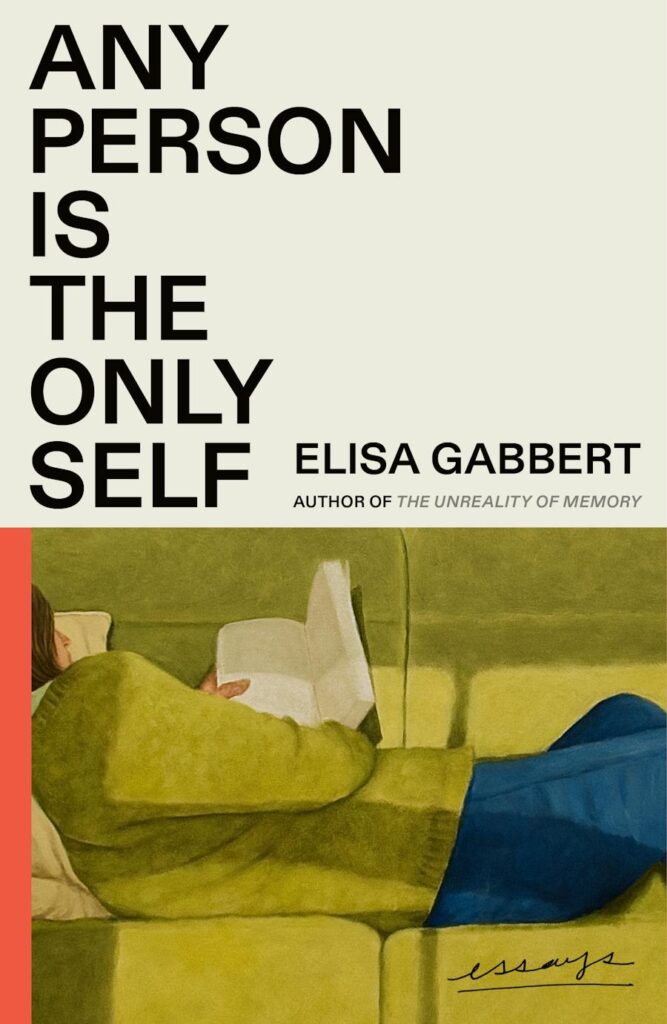
Any Person Is the Only Self is available now from FSG / Bookshop / Amazon / your favorite indie, and as an audiobook.
“Delightfully digressive … [Gabbert’s] writing is full of intimacies, and her book is a work of embodied and experiential criticism, a record of its author’s shifting relationships with the literature that defines her life … Gabbert is a master of mood, not polemic … In place of the analytic pleasures of a robustly defended thesis, we find the fresh thrills of a poet’s perfected phrases and startling observations. Any Person Is the Only Self is both funny and serious, a winning melee of high and low cultural references, as packed with unexpected treasures as a crowded antique shop … She is a fiercely democratic thinker, incapable of snobbery and brimming with curiosity.” — Becca Rothfeld, The Washington Post
“Any Person is the Only Self is absolutely brilliant, full of clarity and mystery and light: Gabbert effs the ineffable, describes the impossible to describe—the state of reading, what it means to remember. I’m still thinking about these essays, by which I mean still thinking about Gabbert’s own thoughts; I keep bringing them up in conversation. Elisa Gabbert is one of my favorite living writers.” — Elizabeth McCracken
“In her third essay collection, which weaves thoughts about reading with a loose running meditation on the impact of the Covid pandemic, the poet and critic celebrates literature and life through a voracious engagement with the world, and the word. It feels like an expression of gratitude for both the act of reading in itself and for reading as a route to conversation, a means of socializing, a way to connect.” — New York Times Editors’ Choice
“Gabbert is one of my favorite living writers, whether she’s deconstructing a poem or tweeting about Seinfeld. Her essays are what I love most, and her newest collection sees Gabbert in rare form: witty and insightful, clear-eyed and candid. I adored these essays, and I hope (the inevitable success of) this book might augur something of an essay-collection renaissance.” — Sophia M. Stewart, The Millions
“Elisa Gabbert is a reader’s reader, smart and funny and endlessly insightful about the pleasures of books, the joys of beloved texts, and the many ways in which the self can be shaped and remade by the lifelong consumption and consideration of art. Any Person Is the Only Self made me want to read even more than I already do, and to do so better and more deeply; long before I reached its last page, I knew I would begin it again the second I finished.” — Matt Bell, author of Appleseed and Refuse to Be Done
“It’s hard to think of another essayist whose intellect is so inviting, so companionable, yet so confident and persuasive—Elisa Gabbert isn’t just brilliant, she makes you feel brilliant too. This book of many subjects—hair metal, Plath, Phil Collins, Rilke, Point Break—really has just one: Gabbert’s erudite, entertaining, inexhaustibly compelling mind.” — J. Robert Lennon, author of Pieces for the Left Hand and Let Me Think
“Any Person Is the Only Self again proves how lucky we are to have Elisa Gabbert—to be able to treat ourselves to her erudition, her capacious curiosity, her writerly verve, her good humor. Gabbert’s playful intelligence courses through these essays like a glittering cool river discovered during a mountain hike, and she is equally adept at finding unexpected profundities in Sylvia Plath or Phil Collins, the uncanniness of childhood, or the pleasures of Point Break. This is insightful, funny, mind-expanding stuff, filled with quiet epiphanies and surprising delights.” — Isaac Butler, author of The Method
“Witty, pensive, curious, and confident … [Gabbert] is a fine writer—deft, astute, and generous about her own experiences yet rarely self-indulgent … This is an erudite book about books that’s worth relishing.” — Kirkus
“In this invigorating collection … the lively commentary offers fresh takes on classic literature … Gabbert is an original thinker, and the literary analysis is refreshingly unstuffy. Bookworms will appreciate these intelligent essays.” — Publishers Weekly